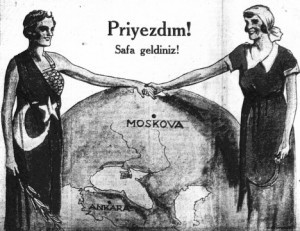Please join the Harriman Institute and the Sakıp Sabancı Center for Turkish Studies for a talk with Sam Hirst, Assistant Professor of International Relations at Bilkent University, Ankara.
Between the First and Second World Wars, the Soviet and Turkish governments led two of the most dramatic political and social transformations of the twentieth century. In spite of significant ideological differences, the two regimes shared a number of characteristics; among these was a commitment to political organization along ethnic lines. Hirst argues that similar assumptions about ethnicity and geography shaped Soviet-Turkish exchanges in the 1920s. When, for example, politicians in Ankara asked that Soviet institutions trade with ethnic Turks rather than Greeks or Jews, Moscow’s representatives readily accepted the logic of the request. For both sides, the attempt to develop Soviet-Turkish relations in narrowly bilateral terms was part of a larger struggle with Western power and its local representatives. To focus on interactions – rather than a comparative analysis of parallel national histories – highlights a transnational frustration with the West that produced processes which transcended state borders and proved constitutive.
Sam Hirst is assistant professor in the Department of International Relations at Bilkent University in Ankara, Turkey. Prior to joining Bilkent, he worked at the European University at St. Petersburg, where he served for two years as department chair. He is currently completing a manuscript on Soviet-Turkish relations in the interwar period. His work has appeared, among other places, in Kritika, Slavic Review, and Comparative Studies of South Asia, Africa, and the Middle East.

